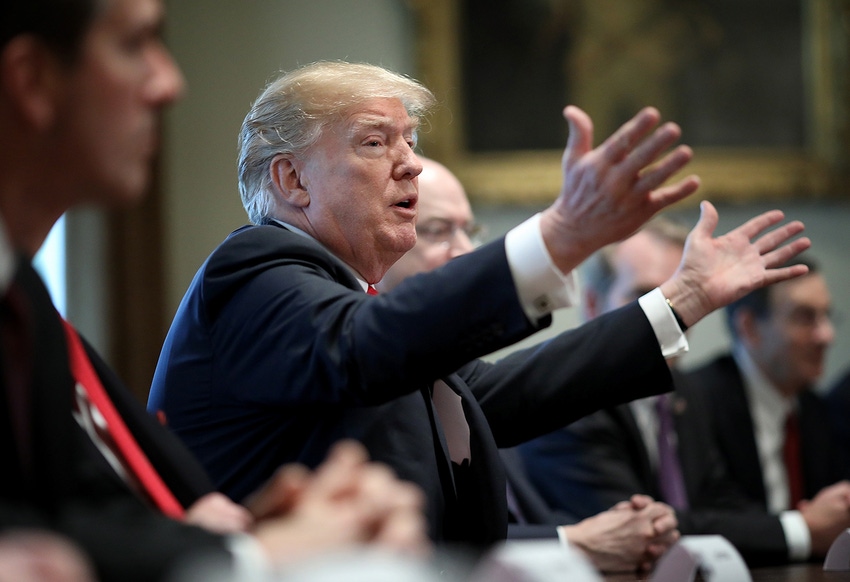Legislative Watch: Tons of tariffs talk; Cochran retiring from the Senate.

President Trump ordered a 25% tariff on imported steel and a 10% tariff on imported aluminum even though concerns among Congressional members, business and agriculture were raised about the increasing possibility of a trade war, increased cost of production for many industries and the effect on relationships with key allies. Trump says, “The American aluminum and steel industry has been ravaged by foreign trade practices. It’s really an assault on our country.”
Many U.S. businesses and industries raised concerns this action will increase the cost of production and increases the potential of a trade war with major U.S. allies and customers. A number of industries and Congressional leaders say the tariffs are too broad and should be more targeted to prevent collateral damage. Trump disregarded these concerns saying “trade wars are good and easy to win.”
The tariffs could have a greater impact on major allies than adversaries. Canada is the largest source of imported steel accounting for 17%, followed by Brazil, South Korea and Mexico. Russia ranks fifth and China is the 11th-ranked source, according to the Department of Commerce.
The announcement immediately drew rejection from the European Union, Canada, Mexico, Japan, South Korea and others. The EU is threatening to respond by imposing approximately $3.5 billion in retaliatory tariffs on U.S. agriculture, consumer and steel products. Trump is now threatening tariffs on imported EU cars if the EU responds with tariffs over the steel and aluminum decision. China’s foreign minister, Wang Yi, says China would be “justified” including a “necessary response.”
Trump says Canada and Mexico would be exempt under a “special case” while the North American Free Trade Agreement negotiations continue. The exemptions could end if the trade talks falter. A procedure is also being established where other U.S. allies can petition to get exemptions on their own.
The tariffs take effect in 15 days.
Ag raises concerns over tariffs
Agriculture is concerned what affect the tariff announcement could have on the agricultural economy, especially if targeted countries respond with retaliatory tariffs.
The National Association of Wheat Growers and the U.S. Wheat Associates say in a joint statement, “We have repeatedly warned that the risk of retaliations and the precedent set by such a policy have serious potential consequences for agriculture. It is dismaying that the voices of farmers and many other industries were ignored in favor of an industry that is already among the most protected in the country.”
The American Soybean Association says, “Retaliation from China would add significant further injury to an already-hobbled farm economy. Prices are down 40% and farm income down 50%, and we simply can’t afford for those numbers to get worse.” China is the largest export market for U.S. soybeans representing a $14 billion market or 30% of U.S. soybean exports.
The National Corn Growers Association in a statement says, “Trade plays an important role in many facets of the U.S. economy and impacts various industries in different ways. Agricultural trade has been a bright spot for U.S. economy, positively impacting our overall trade balance, while providing an important avenue to grow demand for America’s farmers and ranchers. New tariffs on steel and aluminum might not only trigger retaliation from our trading partners, but could also increase the prices farmers pay for necessary equipment, such as tractors and combines. The National Corn Growers Association is hopeful that, as the administration moves forward, it will work to minimize the impacts upon America’s agricultural sector.”
House Republicans urged Trump to target tariffs
Earlier this week 107 House Republicans raised concerns on the negative effects the tariff decision will have on the U.S. economy. House Ways and Means Chairman, Kevin Brady (R-TX) and Trade Subcommittee Chairman Dave Reichert (R-WA) organized the letter to President Trump saying the administration should focus its trade action on China and other unfair trading partners. They raised concerns that broad tariffs could “harm America’s jobs, manufacturers and consumers.”
The members say, “We support your resolve to address distortions caused by China’s unfair practices, and we are committed to acting with you and our trading partners on meaningful and effective action. But we urge you to reconsider the idea of broad tariffs to avoid unintended negative consequences to the U.S. economy and its workers. We are eager to work with you in pursuing a workable, targeted approach that achieves our shared goal.”
They also say, “We are writing to express deep concern about the prospect of broad, global tariffs on aluminum and steel imports. Because tariffs are taxes that make U.S. businesses less competitive and U.S. consumers poorer, any tariffs that are imposed should be designed to address specific distortions caused by unfair trade practices in a targeted way while minimizing negative consequences on American businesses and consumers.”
Cochran retiring from the Senate
Sen. Thad Cochran (R-MS), former chairman of the House Agriculture Committee and current chairman of the Senate Appropriations Committee, announced he was retiring from the Senate effect April 1 due to continuing health issues. He was a strong supporter of the cotton industry and nutrition programs.
About the Author(s)
You May Also Like



